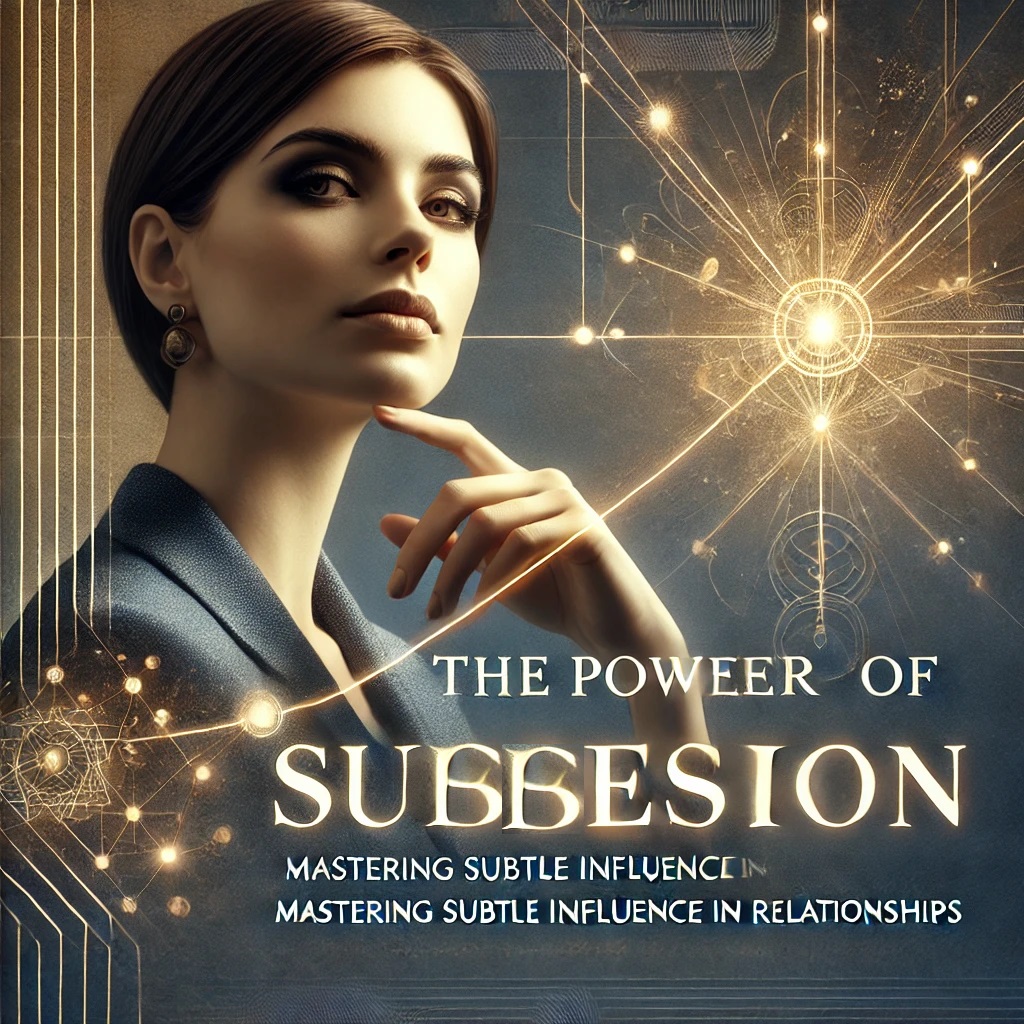In relationships, we often find ourselves wanting to guide our partner’s behavior, decisions, or even emotions. But here’s the truth—direct requests often lead to resistance. The moment your partner feels pushed, their natural instinct is to pull back. That’s where The Power of Suggestion comes into play. It’s one of the most subtle and effective techniques for influencing your partner without ever directly asking for what you want. In fact, suggestion is so powerful that it can change the course of your relationship without a single argument or confrontation.
In this blog, we’ll dive deep into The Power of Suggestion as an influence tool, exploring how it works, why it’s so effective, and how you can start using it today to subtly steer your relationship toward the outcomes you desire.
What Is The Power of Suggestion?
The Power of Suggestion works by planting ideas or thoughts in your partner’s mind in such a way that they believe they’ve come to the conclusion on their own. It’s not about manipulation in the negative sense; it’s about guiding the conversation, influencing emotions, and presenting ideas so subtly that your partner feels like they’re making the decisions.
When you suggest something, you’re not outright asking for it. Instead, you’re planting a seed. Over time, that seed takes root in your partner’s mind, and they begin to think of it as their own idea. By the time the conversation circles back around, they’re already on board with your suggestion, thinking they’ve come to this conclusion naturally.
The beauty of suggestion is that it bypasses the defensive walls that go up when someone feels pressured or controlled. It allows you to gently guide the relationship without your partner ever realizing that they’re being influenced.
How Does The Power of Suggestion Work?
At its core, suggestion works because it appeals to the subconscious mind. When you plant a suggestion, you’re not making a direct request, so there’s no immediate need for your partner to react defensively. Instead, the idea floats in their mind, softly influencing their thoughts and emotions.
Here’s how it works:
- Subtlety is Key: The more subtle your suggestion, the more likely it is to slip past your partner’s defenses. Rather than framing your ideas as something you want, frame them as thoughts or observations.
- Plant the Seed, Then Step Back: Once you’ve planted the suggestion, don’t push. The idea needs time to settle in your partner’s mind. Give them space to reflect on it without feeling pressured.
- Positive Reinforcement: Reinforce your suggestion by linking it to positive emotions or experiences. When your partner associates your idea with something that makes them feel good, they’re more likely to adopt it.
- Let Them Take Credit: One of the greatest powers of suggestion is that it allows your partner to believe that the idea was theirs all along. When they feel like they’re in control, they’re far more likely to follow through with the decision.
Why Is The Power of Suggestion So Effective?
Suggestion is effective because it doesn’t trigger the same defensive mechanisms that direct requests do. When you tell someone what to do, they instinctively want to push back. But when you suggest something, you allow them to process the idea on their own terms.
Another reason suggestion works so well is that it taps into your partner’s natural desire to feel like they’re in control. People resist being told what to do because it makes them feel powerless. But when they think an idea is their own, they’re more likely to commit to it fully, without any lingering resentment.
Relatable Examples of The Power of Suggestion in Action
Let’s explore some practical, relatable examples of how you can use the power of suggestion in your relationship:
Example 1: The Weekend Getaway
You’ve been wanting to go on a weekend trip, but you know your partner isn’t big on planning or committing to things ahead of time. Instead of asking directly, you use suggestion.
How to Use It:
While scrolling through social media, casually mention, “I saw Sarah and Mike took a spontaneous weekend trip to the mountains last week. Doesn’t that sound fun?” You leave it at that, allowing the idea to take root in his mind. Over the next few days, he starts thinking about it more, and by the end of the week, he’s suggesting a weekend trip to you, convinced it was his idea.
Example 2: Helping Around the House
You want your partner to help out more with household chores, but whenever you ask directly, it turns into a frustrating conversation about schedules and priorities. So, you shift to using the power of suggestion.
How to Use It:
The next time you’re cleaning up, casually mention, “It feels so nice when we both get things done around the house. The whole place looks better when we work together.” You don’t make a direct request, but you’ve planted the seed. Over time, your partner will start noticing that helping out makes things run smoother, and eventually, they’ll start pitching in—without you ever having to ask.
Example 3: Spending More Quality Time Together
You’ve been feeling disconnected lately and want to spend more quality time with your partner. Instead of confronting them with a serious conversation, you use suggestion to nudge them in the right direction.
How to Use It:
One evening, while watching TV together, say, “I really love these quiet nights when we just hang out without any distractions. It feels like we’re really connecting.” You’ve planted the idea that spending time together is valuable and meaningful. Soon, your partner might start suggesting more time together because they associate those moments with positive emotions.
Example 4: Encouraging Healthy Habits
Maybe you want your partner to start eating healthier or going to the gym more regularly. Instead of nagging them about it, use suggestion to inspire change.
How to Use It:
Casually say, “I was reading an article about how even small changes in diet can make a big difference in energy levels. It made me think about trying out a new recipe for us.” By framing it as something small and non-threatening, you plant the idea that healthier habits are appealing without making them feel pressured. Before long, they’ll start adopting healthier choices without any arguments or pushback.
Using The Power of Suggestion in Your Relationship
In Chapter 5 of “Mastering Him: The Secret Art of Gentle Control in Relationships,” the book goes even deeper into how you can use suggestion as part of your overall influence strategy. It explains how suggestion fits into a larger framework of emotional intelligence and subtle persuasion, giving you the tools you need to gently steer your relationship toward harmony and success—without the friction.
Remember, the key to suggestion is subtlety. You’re not forcing change; you’re guiding it. The beauty of suggestion is that it allows your partner to feel like they’re in control, which makes them more open to your influence. Over time, suggestion becomes one of the most powerful tools in your relationship toolkit, giving you the quiet power to create the outcomes you want without ever raising your voice or making demands.
Q&A:
- What is the power of suggestion, and how can it help in relationships?
The power of suggestion is an influence technique where you subtly plant ideas in your partner’s mind without directly asking for something. By framing ideas casually, you let them take root, allowing your partner to feel like the decision is their own, which reduces resistance and fosters cooperation. - How can I use suggestion to encourage my partner to help around the house?
Instead of directly asking for help, casually mention how good it feels when you both work together to keep things tidy. This plants the idea that collaboration makes life easier. Over time, your partner may feel inspired to pitch in without being asked. - Why is suggestion more effective than direct requests in relationships?
Direct requests often lead to defensiveness, as they can feel like pressure. Suggestion, on the other hand, is subtle and lets your partner process the idea naturally, making them more likely to act on it because it feels like their own choice. - How can I use suggestion to spend more quality time with my partner?
Mention how much you enjoy quiet evenings together or recall a recent memorable date, linking it to positive emotions. By highlighting how good those moments feel, you gently nudge your partner to value and seek out more quality time together. - Can suggestion work to encourage healthy habits in a partner?
Yes, suggestion can inspire change. Casually bring up something you read about health benefits or a small diet tweak you’re trying, making it sound light and appealing. This approach plants the idea without feeling like a demand, encouraging them to try it out voluntarily. - What are examples of using suggestion to influence a partner’s behavior?
- Household help: Mention how nice it is to share chores for a tidy home.
- Weekend getaway: Casually suggest how fun a spontaneous trip would be after seeing a friend’s travel photos.
- Healthy eating: Talk about how a recent recipe boosted your energy levels.
These examples use subtle hints rather than direct requests to inspire action.
- How does the power of suggestion work on a psychological level?
Suggestion appeals to the subconscious mind, allowing ideas to sink in without triggering defensiveness. Because it’s indirect, it bypasses the urge to resist or push back, making your partner feel they’re making the decision independently, which increases commitment to the change. - What’s the best way to approach suggestion without seeming manipulative?
Keep it light and conversational, framing suggestions as casual thoughts or things you’ve noticed, rather than demands or even specific requests. Be patient, giving your partner time to process and warm up to the idea naturally. - Can I use suggestion to get my partner to plan a vacation or outing?
Yes! Bring up a friend’s recent trip or mention a beautiful place you came across online. Express enthusiasm about how fun or relaxing it looked. By sparking interest without asking, you plant the idea that a trip would be enjoyable, leaving them to suggest it later. - What are common mistakes to avoid when using suggestion in relationships?
- Overly obvious hints: If suggestions feel forced, they lose effectiveness.
- Lack of patience: Give your partner time to process the idea.
- Using it too frequently: Overuse can make suggestions feel manipulative.
Approach suggestion subtly and sparingly for the best results.
Want to Master The Power of Suggestion?
If you’re ready to stop pushing and start influencing, “Mastering Him: The Secret Art of Gentle Control in Relationships” is your ultimate guide. Chapter 5 breaks down The Power of Suggestion in detail, along with 12 other practical techniques that allow you to subtly shape your relationship for the better.
Get your copy today and start mastering the art of influence. Because why struggle for control when you can have it effortlessly?
Read more about the book: https://developmentpill.com/mastering-him-the-secret-art-of-gentle-control-in-relationships-a-guide-to-influence-hell-never-see-coming/
Book Link: https://www.amazon.com/dp/B0DKKGLZQ9
Book Link UK: https://www.amazon.co.uk/dp/B0DKKGLZQ9
You can find book Links for other regions in this post page: https://developmentpill.com/mastering-him-the-secret-art-of-gentle-control-in-relationships-a-guide-to-influence-hell-never-see-coming/



